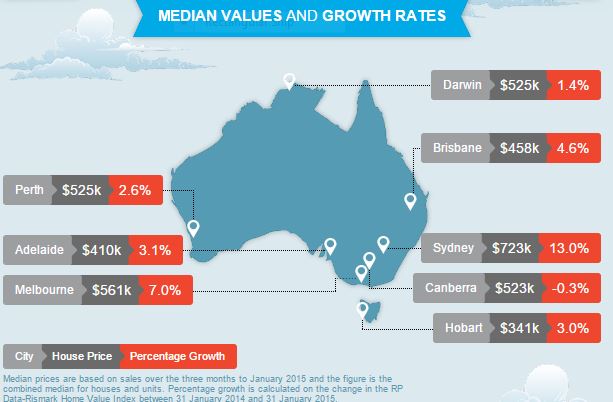Hi Everyone,
The case for the RBA resuming interest rate cuts this year has been fairly clear: commodity prices have fallen more than expected; the $AUD has remained relatively high; while residential construction and consumer spending are okay the outlook for business investment has deteriorated pointing to overall growth remaining sub-par; and inflation is low. This has seen the cash rate fall to 2.25%. While the RBA left rates on hold at its April meeting, it retains an easing bias pointing to further cuts ahead.
Whilst some of the data such as the latest ABS jobs numbers are contradictory, I still believe that we will get further Rate reductions and that this will continue to be supportive for for Growth Assets such as Property. Since this will increase the affordability on a national basis, I believe we will continue to see price growth in the Sydney market even though there are constant stories of this being in bubble territory.
The jobs data has caused the Aussie Dollar to appreciate above 78 cents to the USD due to the market now thinking that the RBA is now more likely to leave rates on hold at the May meeting, however, this in itself causes another problem for the RBA as it is trying to talk the currency down to add some stimulus to the Economy.
BetaShares chief economist David Bassanese has forecast the official cash rate to end the year at 1.5 per cent and the Australian dollar to sink to US68 cents. According to Mr Bassanese, the monthly level of home building approvals is already near previous cyclical peaks, suggesting there is little room to further increase supply.
“Should home building approvals peak within coming months, it would also mean home building activity will start to decline by late this year [or] early 2016 – undercutting what has recently been an important source of economic growth,” he said.
The other piece of trivia which comes up at this time of year …… every year, is the speculation that the Government is going to abolish negative gearing. I’ve learnt that it is unwise to make categorical sweeping statements, but I was speaking to some clients two weeks ago about this and told them that “Negative Gearing will not be affected in the Budget”. Fortunately, Tony Abbott made the statement to the Press last week so that we can now put this to bed, at least for this year !
As always, I hope you find this interesting reading and that it helps you make better informed decisions.
Best Regards,
Dr Andrew Unterweger
MB BS, CFP®, Dip FP, Dip FNS, MFAA, AFA, SPAA, REA
The negative gearing myth of 1985: ACOSSA quarantining approach was adopted by the Hawke government in 1985 when it effectively abolished negative gearing for rental property investments. For two years after the announcement of the policy, expenses related to rental property investments could not be claimed against income from other sources such as wages. In return for this restriction on deductions, a depreciation allowance was introduced to encourage investment in new rental housing. Existing investments were not affected.
|
|
Should you wait to buy?John McGrath Turn your mindset around. If you buy now, you’re likely to enjoy some decent capital growth before the year is out. RBA’s Financial Stability Review & housing market analysisThe Reserve Bank (RBA) released its bi-annual Financial Stability Review (FSR). As you’d expect, the residential housing market features heavily in their assessment of financial stability. |
|
Housing recovery continues Australian economic data from the past week shows the housing recovery is continuing, according to AMP Capital chief economist Shane Oliver. Despite a small fall in February, building approvals remain close to record highs and new home sales remain solid, pointing to continued strength in dwelling construction, Mr Oliver said. “While home prices continued to rise in March this was concentrated in Sydney, with other cities decidedly soft, indicating that despite the hoopla, home price momentum overall is waning,” he said. “It is also noteworthy that there has been some modest loss of momentum in investor housing credit.” As a result, Mr Oliver believes the housing market may be becoming less of a constraint on the RBA’s flexibility to cut interest rates again. Meanwhile, homebuilding continues to gather momentum across the nation.
|
|
RATES FORECAST TO FALL TO 2PC By Smart Property Investor Staff Reporter Friday, 06 February 2015 Two prominent economists have praised the Reserve Bank of Australia’s decision to reduce the cash rate and have predicted at least one more cut to come. Domain Group senior economist Andrew Wilson said the Reserve Bank had made the right decision to reduce the cash rate from 2.5 per cent to 2.25 per cent. Dr Wilson also said that another cut is likely, given that the economy received minimal stimulus from the succession of rate cuts between October 2011 and August 2013.
“We haven’t had much action from cutting from 4.75 per cent to 2.5 per cent, so I’m not sure what a 0.25 per cent improvement is going to do,” he told Smart Property Investment's sister publication Real Estate Business. “Certainly the Reserve Bank had to act – it’s really the only tool in the box that we’ve got left.” Pricing gaps across product types and capital cities are widening by Cameron Kusher 30 January 2015 The cost of Sydney housing relative to other capital cities is widening and the cost of buying a house as opposed to a unit is increasing as a record number of units commence construction. The cost of Sydney housing relative to other capital cities is widening and the cost of buying a house as opposed to a unit is increasing as a record number of units commence construction. According to median selling prices over the three months to December 2014 published in the CoreLogic RP Data Home Value Index report, the gap between capital city house and unit prices has never been greater. As at December 2014, the capital city median house price was almost 20% higher than the capital city median house price. In dollar value terms, median house prices are $100,000 greater than unit prices. read more...
John McGrath ignites Sydney's "hot forever" inner ring debate by Jonathan Chancellor 1 FEBRUARY 2015 John McGrath has always been passionate about the property prospects of Sydney’s inner ring suburbs. But last week he went a little further, saying suburbs close to the city are becoming so desirable that they will be “hot forever” But last week he went a little further saying suburbs close to the city are becoming so desirable that they will be "hot forever". The high profile agent stopped short of declaring inner city property prices were immune from price falls. But the chief executive of McGrath Estate Agents told Fairfax Media these areas would always be attractive to buyers. "There is just no end of demand from overseas and local buyers who want to live in those precincts," McGrath said. |
|
|
Sydney property bubble to pop when rates rise, says HSBCWednesday, 11 Feb 2015 | James Mitchell 0 · · A fresh round of cheap credit is further inflating Sydney’s investor-driven property prices. In a research note released yesterday, HSBC economists Paul Bloxham and Daniel Smith predict strong national housing price growth to continue at seven to eight per cent, driven by record-low mortgage rates. “We see Sydney prices rising by 9 to 10 per cent in 2015 and expect that, when rates do eventually rise, there is now a high risk that Sydney will see price falls,” the economists said. “Although we do not see a national housing bubble, we believe that growth in Sydney housing prices is currently running at an unsustainable pace and that any further growth is likely to be met by housing price declines in future years, when interest rates do begin to rise,” they said. A signal of the growing risk of overinflation in the Sydney market is the high level of investor demand, according to HSBC.
|
|
JESSIE RICHARDSON | 10 FEBRUARY 2015 Melbourne growth to stand out in 2016: HSBC's Paul Bloxham Melbourne will see the highest price growth of any capital city next year, HSBC has forecast. In the latest HSBC Australia Downunder Digest report, HSBC Australia chief economist Paul Bloxham forecasts 4% to 8% price growth in Melbourne for 2016, after 7% to 8% growth in 2015. Bloxham expects that in 2015, Melbourne and Sydney will "continue to outpace the rest of the nation", noting that from its mid-2012 trough, Melbourne's housing prices have increased by 20%. Read more
|
|
Commonwealth Bank posts 8pc half-year profit rise to $4.5b By business reporter Michael Janda Updated 11 Feb 2015, 5:49am
PHOTO: The Commonwealth Bank has posted its half-year results. (ABC News: Nic MacBean, file photo) The Commonwealth Bank has reported an 8 per cent rise in half-year profit to $4.54 billion. The bank's preferred cash measure of net profit, which adjusts for some accounting items, also rose 8 per cent to $4.62 billion. CBA said its improved profit came on the back of a 5 per cent increase in revenue, despite subdued conditions in the lending market. It also said it had lowered its cost to income ratio by 70 basis points to 42.2 per cent, as productivity initiatives continued to contain business expenses.
http://www.abc.net.au/news/2015-02-11/cba-half-year-profit-result/6084926
|
Australian Home Prices and Interest Rates – April 2015



 Dr Unterweger is a highly qualified financial and property adviser, experienced venture capitalist and successful investor
Dr Unterweger is a highly qualified financial and property adviser, experienced venture capitalist and successful investor